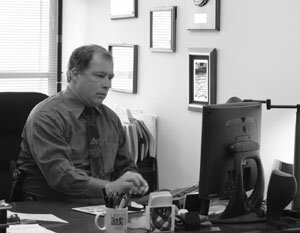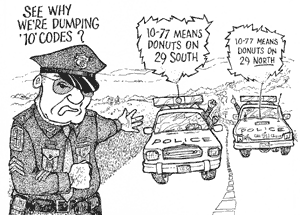NEWS- 10-7: Cop-speak out of service
Generations raised on cop shows who thrilled to the patter of a "10-4" may soon find 10-code lingo only in reruns.
On November 1, the Virginia State Police moved toward a new method of communication: English.
The problem with the time-honored 10-codes? Too many of 'em mean different things in different jurisdictions. And in multi-jurisdictional responses, like during 9-11, such a Babel can be disastrous.
Take 10-50. Depending on whether you're in Virginia or Maryland, it could mean "vehicle accident" or "officer down," according to Charlottesville Fire Chief Charles Werner.
"The Charlottesville Fire Department stopped using 10 codes 20 years ago for that reason," says Werner, chairman of the State Interoperability Executive Committee, which recommended the shift to common language (perhaps reeling from the weight of its own moniker).
"You don't want to have codes that interfere with your ability to operate," Werner points out.
Locally, 10 codes were already on their way out. When the Emergency Communications Center opened in 1985 to dispatch for city, county and university emergency services, "We needed a universal code because we're multi-jurisdictional," says communications supervisor Kathy Richardson. "Plain text was the way to go."
She remembers when a 10-95 in Charlottesville meant "open the sally port door," while for Albemarle police it meant "in custody."
"Obviously we couldn't have different codes with one dispatch center," she says.
"We've been using plain talk for about 15 years," says Albemarle police lieutenant John Teixeira. "About 90 percent of our talk is plain talk."
Albemarle retained 17 of the 10 codes, and officers use maybe 10 of them regularly, estimates Teixeira. For example, if a suspect is driving a stolen car, 10-29 relays that information. Teixeira concedes that while the average citizen wouldn't know what that meant, criminals probably do.
Some state police officers are grappling with going 10 code-less, but for Albemarle police, "It's not a topic of discussion," says Teixeira.
He describes the shift to English as an evolution in law enforcement. "Sometimes there were so many 10 codes, no one knew what they all meant," he says.
At the Emergency Communications Center, if a 10-code-talking state police officer reports a 10-33 situation, "We ask them specifically what they mean so there's no misunderstanding," says Richardson.
Or if Nelson County calls in with its disabled vehicle 10 code, "Some of the newer [dispatchers] will say, 'I have no idea what that means,'" she adds.
On the state level, Governor Tim Kaine encouraged the change to plain talk, but Werner says there's no real mandate to do away with all the 10 codes. "The mandate is to use as much common language as possible," he says.
The commission was sensitive to police concerns that sometimes you just don't want a suspect in a hostile situation to know what you're saying.
But Werner debunks the common perception that 10 codes are shorter. Where before officers responding to a call might say "10-8" or "10-76," now they say simply, "responding," explains Werner.
But what about 10-4, which rocketed to popular acclaim during the 1970s' boom in Citizens Band radios? That can be replaced with "okay" and further shortened. "In New York, they say 'K'," says Werner.
The return to English brings its own problems. Jurisdictions going to plain speak are concerned, says Werner, about how to get their people to stay succinct on the radio. He foresees "how to be brief" classes in some officers' futures.
And if officers decide to meet for a quick bite at the nearest sushi or salad bar, they don't have to ask, "What's your 10-20?", 10-20 being "location."
"A lot of them are moving to cellphones to keep that off the airwaves," notes Teixeira.

Albemarle's Lieutenant John Teixeira says "10-4" all the time– to his kids. "They roll their eyes," he admits.
PHOTO BY WILL WALKER

#